Wedding Venue Contract
The truth is that wedding planning may be more technical than romantic. From determining the number of guests to selecting a reception venue, both the bride and groom must take precautions throughout the planning process. That being said, having a wedding venue rental agreement can ensure that these minute details are taken care of and aligned, leaving no room for errors on your wedding day.
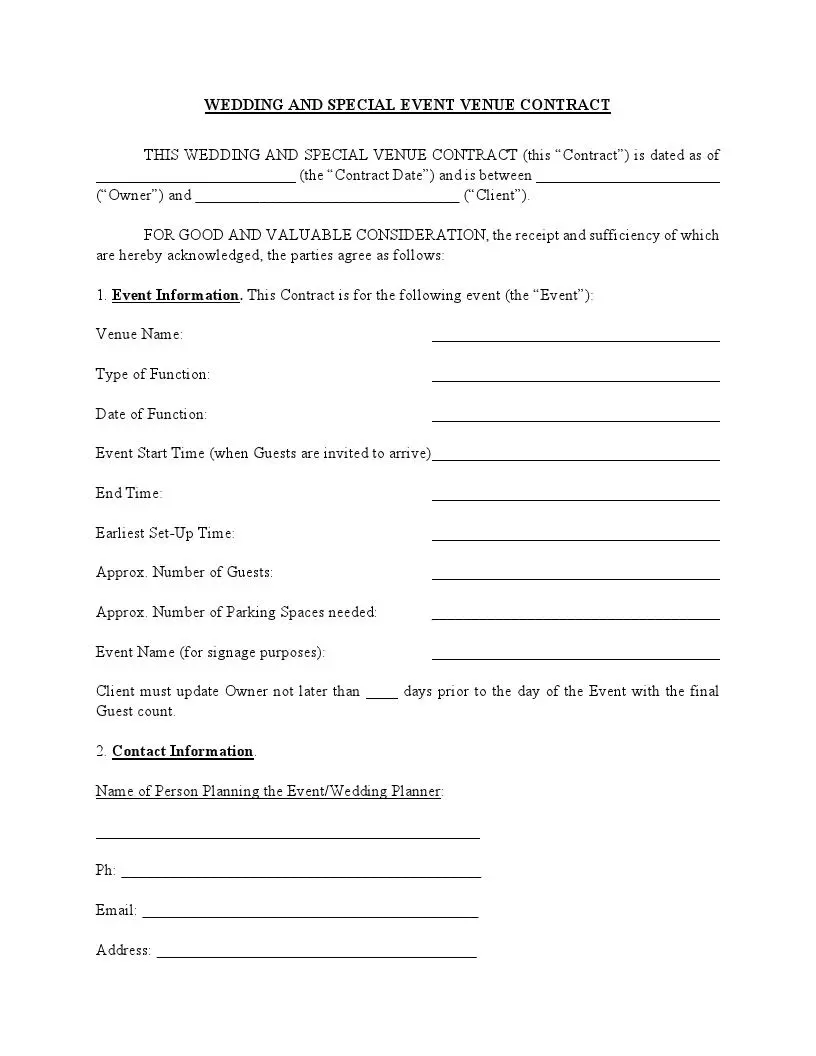
Build Your Document
Answer a few simple questions to make your document in minutes
Save and Print
Save progress and finish on any device, download and print anytime
Sign and Use
Your valid, lawyer-approved document is ready
Why Use a Wedding Venue Contract?
The commercial lease template is always practical and useful. When you have a wedding venue contract, you:
- Can make sure that everything is exactly as planned—from the table settings to the music.
- Can stay within budget, since contracts can make negotiations more effective.
- Can easily search for a professional vendor through the venue provider. Normally, a professional wedding venue can package services and equipment for a lower price.
- Will know the do’s and don’ts while renting the premises. When you and your guests are aware of the rules, it will be easy to avoid breaking them on your wedding day.
- Can hold the owner accountable should any complications—hopefully none—arise.
Wedding planning may be the first big project couples take on together. In cases like these, securing a written lease agreement from their vendor is a must to ensure the success of the ceremony as well as please their family members.
How to Negotiate a Venue Contract
Step 1 – Set an initial meeting.
Couples usually have a vision of what they want their weddings to look like. By setting up a meeting with the provider, they will know how they can make that vision come to life. Make sure to discuss concerns like food, entertainment, and other additional services. If you have a wedding planner, it may be best if he or she is also present during the meeting.
Step 2 – Wait for the venue owner’s proposal.
After the meeting, the owner may need some time to draft a quotation that suits what you need. This can then be sent over to you via e-mail, which you and your partner can assess. Once the proposal is printed out, you can make notes and plan your negotiation strategy. You may use the checklist in FormsPal’s template for this.
Step 4 – Negotiate and look for a compromise.
If you’re under a tight budget, be honest with the provider and ask if they can draft a package that suits that budget. Cutting costs can come in various ways—reducing the add-ons by outsourcing, limiting the number of dishes, simplifying the decorations, and lots more.
Step 5 – Finalize the new agreements.
During the negotiation, you may want to have a revised contract already printed out. In this way, you and the owner can finalize on the spot. Just make sure that the document is fully reviewed before signing.
What Should Be Included in the Contract?
Wedding venue contracts are quite different from normal rental contracts. Not only do these affect the location but also ensure the program’s smooth flow. When writing or checking the contract, make sure they contain the following:
1. Contact Information
This should include the name, mobile number, e-mail, and address of the bride and the groom as well as their wedding planner and preferred vendors. Aside from this, the owner should also provide all contact information of their assigned managers or personnel. This will ensure proper coordination that will ensure a smooth reception program.
2. Schedule
Securing a date and slot should be the first thing that must be done. Therefore, the contract should also contain this information to avoid overlaps and have the venue 100 percent prepared in time for the ceremony or the reception. It is also important to notify any outsourced vendor about the time slot.
3. Financial aspect of the agreement
To reserve and block the venue, a down payment is usually made. This aspect can come before you sign the contract. However, couples are highly encouraged to finalize details through a written agreement first in order to avoid an unfair cancellation policy, hidden charges, and a non-refundable deposit. The wedding venue contract should detail these along with the total cost.
4. General information about the Wedding
All agreements resulting from the planning process should be finalized in the contract. These include the number of guests, room or space to be used, and services that will be availed. The bride and the groom may also put the decoration plan since this would affect the provider. Thankfully, those who have professionally hosted weddings before can already present several tried and tested different designs to suit different tastes.
5. Food
The food is one of the highlights of the wedding, aside from the bride and the groom, of course. If the venue also takes care of preparing and serving the dishes, it is best to pre-select their offerings and list these in the agreement. It is important to know your state’s laws and lockdown guidelines and whether liquor may or may not be served.
6. Scope of Services
The good thing about a professional wedding venue is that they have their own vendor and can package wedding-related services. However, the scope (e.g. duration, manpower, type of service, etc.) should also be clearly listed in the contract.
7. Rules and limitations
Rules vary from location to location, especially with Covid-19 restrictions changing now and then. All these, including health declarations, should be written in the contract to avoid future problems.
8. Indemnification Clause
Like any other agreement, both parties should know the indemnification clause, which will require the offending group to fix or pay for damages. If the event or premises is insured, there is nothing to worry about. If not, the couple may simply pay for insurance coverage, just in case.
Once your wedding venue contract contains the above information, you’re all set! Just make sure to review it and search for possible loopholes. In case you’re looking for a template, you can download FormsPal’s free wedding venue contract below.
Wedding Venue Contract Form Details
| Document Name | Wedding Venue Contract Form |
| Other Name | Wedding Event Contract |
| Avg. Time to Fill Out | 20 minutes |
| # of Fillable Fields | 165 |
| Available Formats | Adobe PDF |
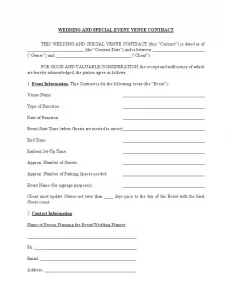
Filling Out the Wedding Venue Contract Form
Step 1 — Download the Application Form.
Choose the file that is compatible with your computer:
- Wedding Venue Contract Template – Open Office Format (.odt)
- Wedding Venue Contract Template – Microsoft Office Format (.docx)

Step 2 — Fill out the opening paragraph.
- Blank 1: Write the date when the contract was finalized.
- Blank 2: Name of the wedding venue owner. This may also be the title of the company that operates it.
- Blank 3: Complete names of the bride and the groom or their coordinator.
Step 3 — Add information about the event.
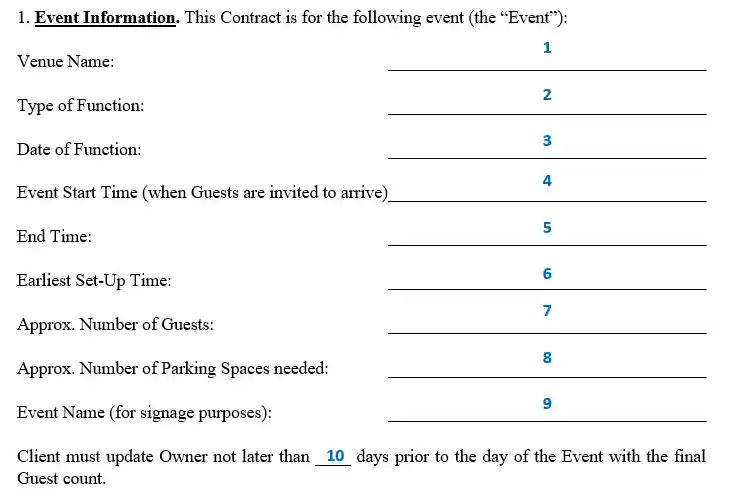
Fill out the required information above according to the description. When filling out the blanks, consider the following:
- For Blank 1: Be specific. Add the room or hall number where the wedding will take place.
- For Blank 4: Write when the area should be ready. The entourage may arrive earlier, but other guests should be informed to only enter the venue at the time indicated above.
- For Blank 10: You may indicate an estimated number of guests first. Once you’ve finalized your guest list, inform the owner of the actual headcount before the deadline indicated above.
Step 4— Include the contact information.
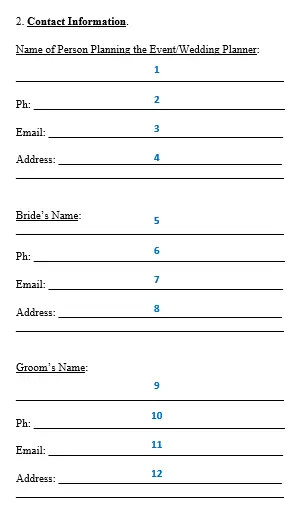
- Blank 1: Full name of the event coordinator
- Blank 2: Mobile and landline numbers
- Blank 3: E-mail address
- Blank 4: Mailing address
Repeat the same information for the couple (blanks 5 to 12).
Step 5— Fill out the event checklist.
Below are several services and add-ons, which you can negotiate with the owner. Everything is pretty straightforward, but we’ve provided some tips below to guide you.

- Blank 1: Ask the venue owner the total square feet of the usable space. You may also get a layout, which you may want to use for planning your wedding day.
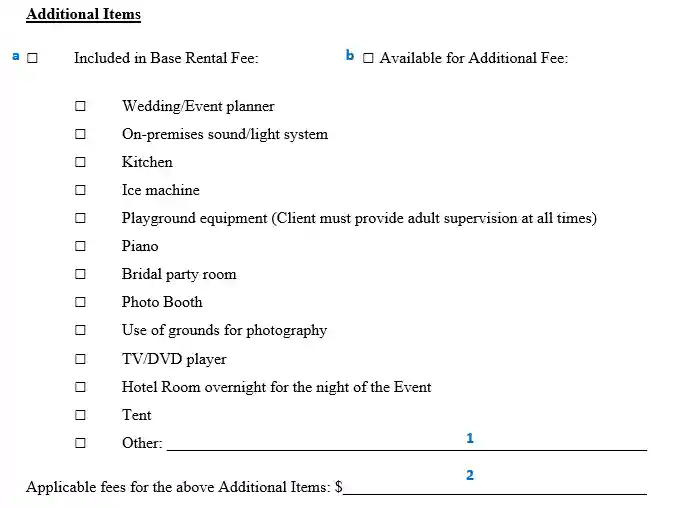
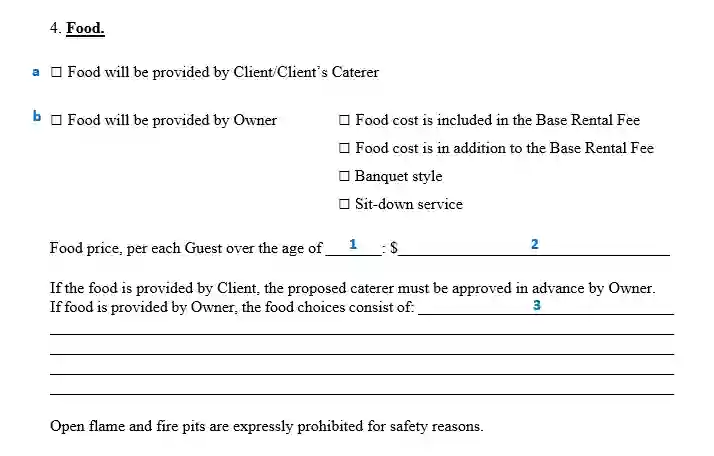
- Box B: If you choose to get the owner as your food vendor, select the manner of payment (tick either the first and the second boxes on the right). Then, select the dining setup (third and fourth boxes).
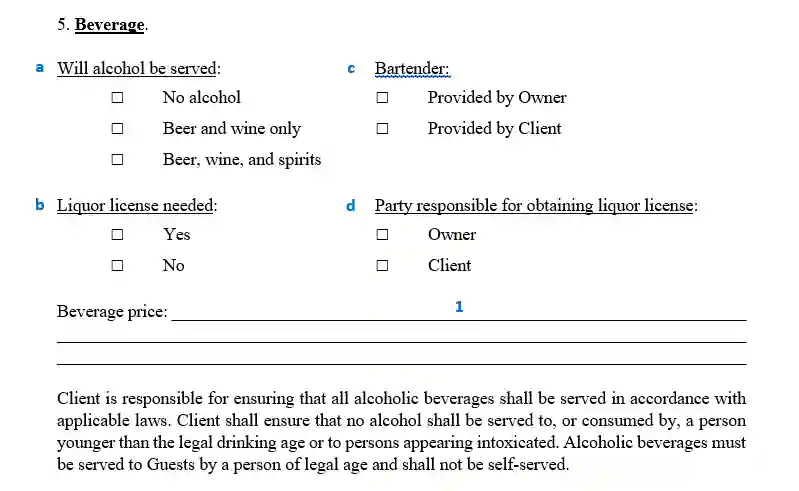
- For categories A to D, tick the applicable boxes.
- Blank 1 applies if the owner will provide the liquor. If not, simply write “c/o Client.”
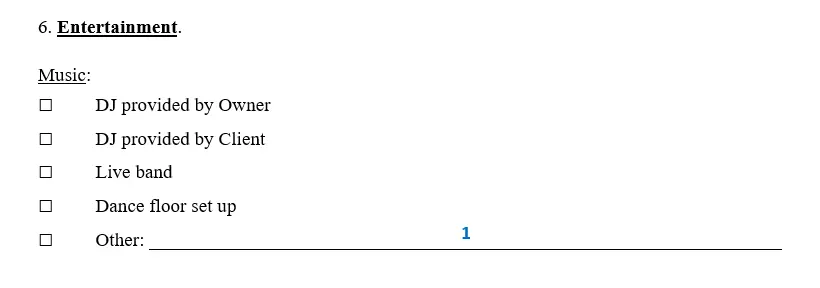
- Tick all the applicable boxes from above. If there are other entertainment-related add-ons (e.g. host, karaoke rental, same-day video editing), kindly indicate these in Blank 1.
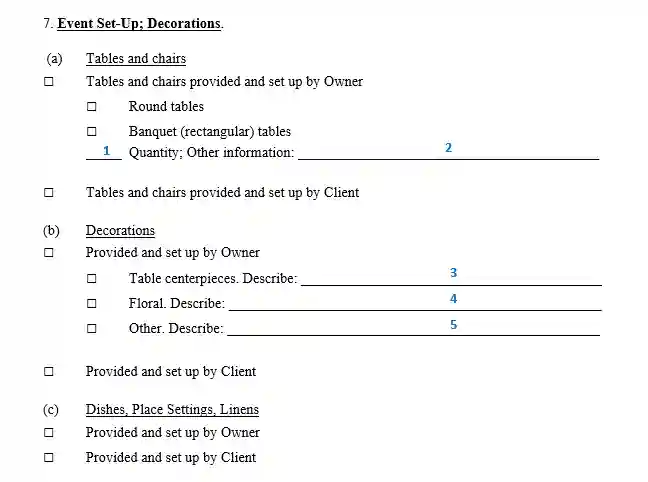
- Tick the applicable boxes above.
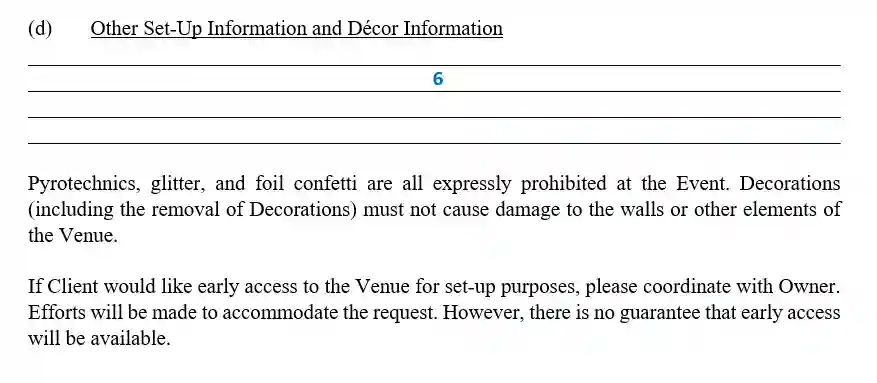
- Lastly, you may add more descriptions or special requests.
Step 6— Provide plans for the egress.
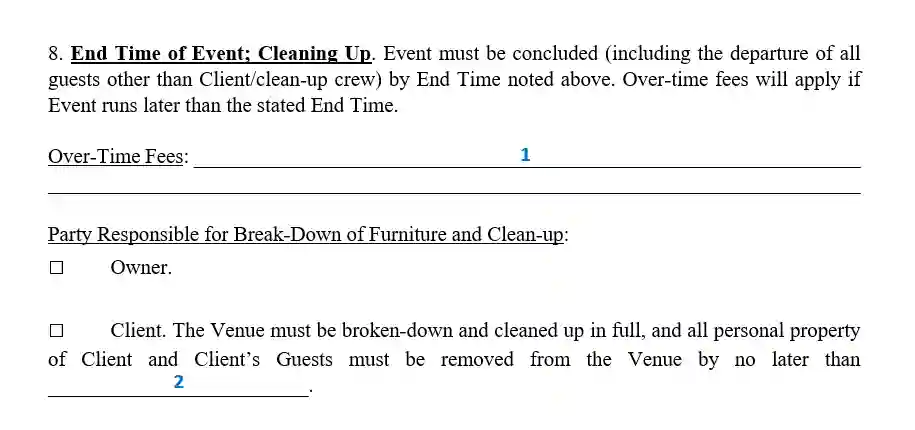
- Blank 1: Should the event exceed the time allocated for their event, add the grace period as well as the amount of overtime fee.
- Blank 2: If the client is in charge of the clean-up, indicate when egress should be completed.
Step 7— Finalize the fees.
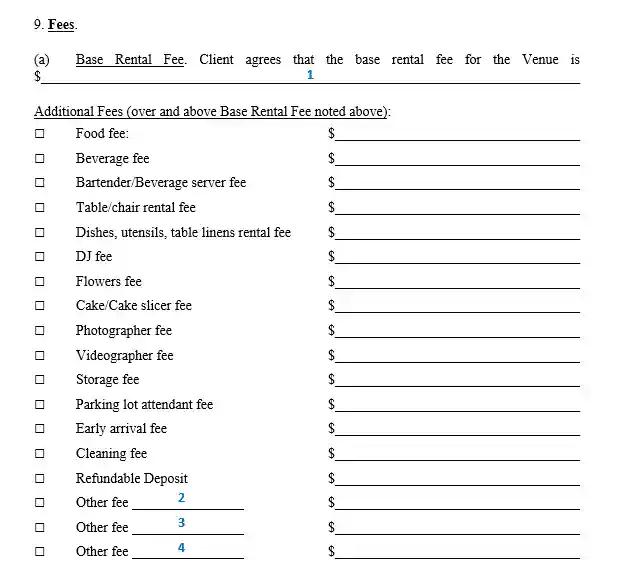
- Blank 1: Write the “base fee” or lowest price the venue could be rented for (without the extras).
- Blanks 2 to 4: You may then write other services that were added during the negotiation process.
- For the rest of the boxes, tick the items that would be provided by the owner. Then, write the amount in its corresponding blank on the right column.

- Blank 5: Write the amount for taxes. You may check your state’s tax percentage on these types of events.
- Blank 6: Write the total amount of all the fees.
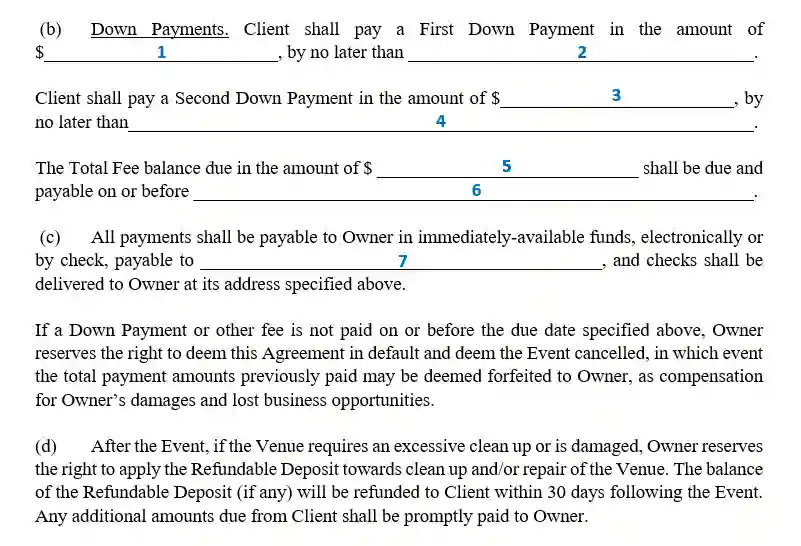
After detailing the fees, both parties should agree with the above clauses and fill out the following:
- Blank 1: Write the amount of the down payment (normally 25 to 50 percent of the total). Take note that for some venues, the down payment becomes non-refundable after a certain date.
- Blank 2: Deadline of the down payment
- Blanks 3 to 4: If you chose a staggard scheme, the rest will be written in these blanks.
- Blank 5: The balance or the remaining amount to be paid (total minus the deposit).
- Blank 6: Deadline for the balance.
- Blank 7: Name of venue owner or operator. You may also ask for the account number, so you can make a direct deposit instead.
Step 8— Disclose the insurance policy.
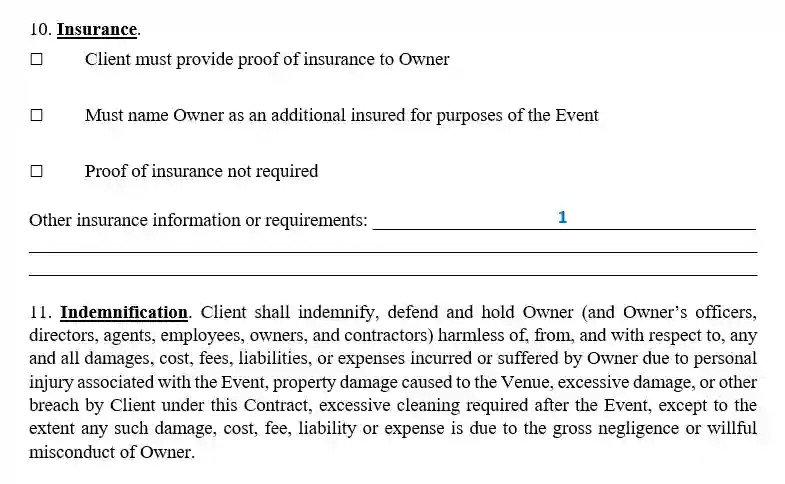
- For section 10, tick the applicable box and list the client’s or owner’s policy details on blank 1. These may be attached to the contract as well.
- Section 11 goes hand-in-hand with the previous terms as this clause explains that both parties are liable for any damage that resulted from their negligence or willful misconduct.
Step 9— Add conditions for cancellation and read the other clauses.
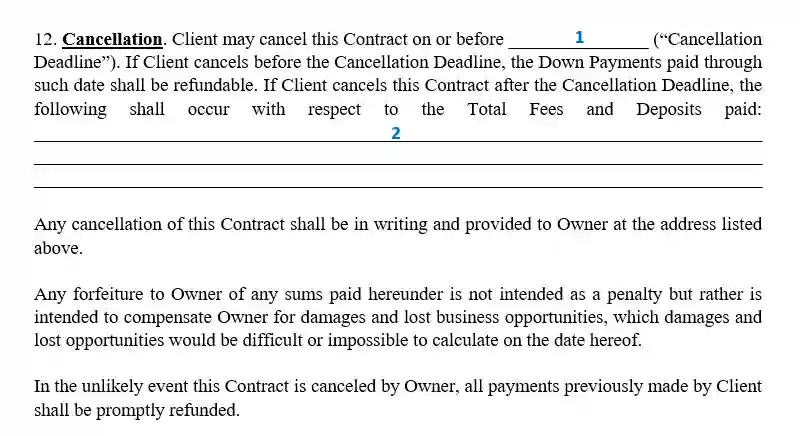
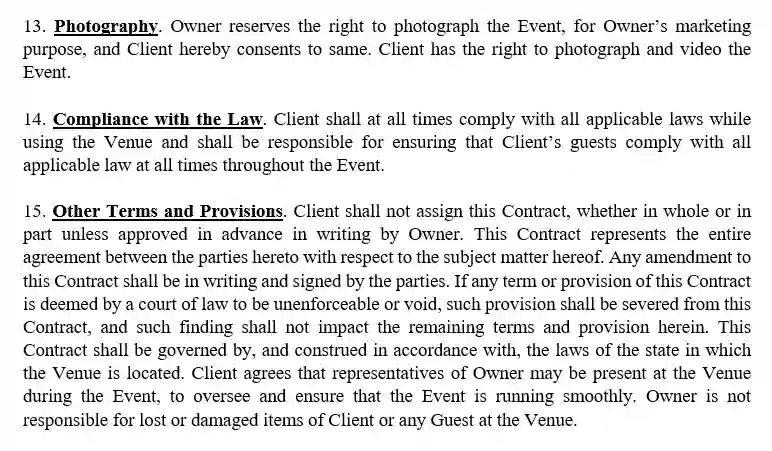
- Blank 1: Add a cancellation date. Since weddings are normally scheduled months before the actual event, venue rentals are often canceled. While this is allowed, owners should indicate a deadline for changes (e.g. 2 months before the event).
- Blank 2: This blank should contain the consequences of breaking the contract beyond the agreed deadline. Depending on your state, down payments are forfeited or a penalty would be applied.
Step 10— Write additional terms and conditions.

Discuss and negotiate with the owner. If you find a loophole in your agreements, you may still add special conditions in section 14.
Step 11— Sign it.

Blank 1: The company’s title (if applicable. Otherwise, leave it blank).
Blank 2: Sign above the blank.
Blank 3: Full name of the representative or owner
Repeat the same information for the second column.
Frequently Asked Questions
Who Should Sign the Contract?
Signatories to the contract include the owner and the couple (either the bride or the groom will do). In some cases, professional wedding planners can also help or oversee the booking under their company name. Witnesses may also sign the contract.
Is It Possible to Make Changes to the Contract?
Yes, contracts can be amended if needed. These may come in the form of attachments or an entirely new agreement that replaces the old one.
What is a Contingency Plan for the Wedding Venue?
An outdoor space like a garden or a beach should always have a backup in case of bad weather. If such a problem occurs, it is best to prepare a nearby covered area as backup. It is highly recommended for the reception to be held in a hall because this would double as a back-up for the open-air ceremony. An instruction to transfer to this venue does not need to be indicated in the guest card or invitation.
Good wedding venues are difficult to find, but planning your wedding day is even more difficult. Fortunately, Formspal can help with its free template that can simplify everything and deliver exactly as planned. The form is also editable and can be used in different events.